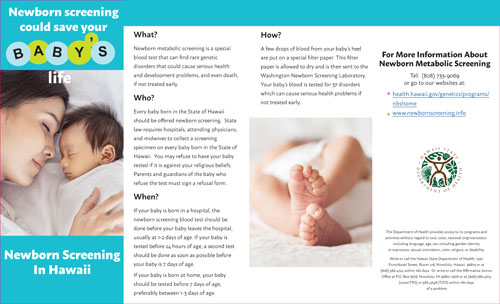To request language or accessibility for HDOH programs or public meetings, please contact the HDOH Non-Discrimination Coordinator, at (808) 586-4400 or email: [email protected]. Please allow sufficient time for HDOH to meet accommodation requests.
如欲針對在 HDOH 計劃或公開會議中提出語言或無障礙便利方面的要求,請聯絡 HDOH 非歧視協調員,致電 (808) 586-4400 或發送電子郵件至: [email protected]。請為 HDOH 留出足夠的時間來滿足您的便利要求。
Ren eom kopwe tungor fosun fonu ika atotongeni ren HDOH programs kena ika mwichen aramas meinisin kena, kose mochen kori ewe HDOH Non-Discrimination Coordinator, non (808)586-4400 ika email: [email protected]. Kose mochen mut ngenitamenon fansoun ren an HDOH epwe tori anenian tungor kena.
No ke noi ‘ana i kōkua ma ka māhele ‘ōlelo a i ‘ole ka lawelawe kīnānā ‘ana no nā papa hana a ka HDOH a i ‘ole nā hālāwai no ka lehulehu, e kūkā me ka Luna Ho‘okae o ka HDOH ma ka helu (808) 586-4400 a i ‘ole e leka uila i ka [email protected]. E ‘ae aku i ka manawa lō‘ihi kūpono e ho‘oponopono ai ka HDOH i kāu noi.
Tapno agkiddaw ti lenggwahe wenno pannaka-access ti programa ti HDOH wenno pampubliko nga miting, pangaasim ta kontakem ti non-discrimination nga coordinator ti HDOH sadjay (808) 586-4400 wenno email: [email protected]. Pangaasim ta ipaayam tiHDOH ti undas a tiempo a mangasikaso dagiti kiddaw ti pagdagusan.
HDOHのプログラムまたはオープンな会議における言語やアクセシビリティのリクエストは、HDOH無差別コーディネーター(電話:(808) 586-4400、またはメール: [email protected])までご連絡ください。HDOHがご要望にお応えできるよう、十分な時間をお取りください。
HDOH 프로그램 또는 공개 회의에 대한 언어 지원 또는 장애인 편의를 요청하시려면 HDOH 차별금지 조정관에게 (808) 5864400으로 전화하거나 이메일( [email protected])로 연락해 주십시오. HDOH에서 요청된 편의 사항을 마련할 수 있도록 충분한 시간을 주시기 바랍니다.
如需申请针对 HDOH 计划或公开会议的语言或无障碍服务,请致电 (808) 586-4400,或发送电子邮件至: :[email protected] 联系 HDOH 非歧视协调员。请留出足够的时间,以便 HDOH 有充足的时间来满足便利安排请求。
Ñan kajjitõk am maron bõk melele ikijen kajin ak lale melele ko ñan burokraam ko an HDOH ak kwelok ko aoleb armij remaron etal ñane, jouj im kebaak Rikõlaajrak eo ej lale Ejellok Kalijeklok an HDOH, ilo (808) 586-4400 ñe ejab email: [email protected]. Jouj im lelok ien ñan an HDOH kõtõbrak kajjitõk ko ikijen mennin jibañ.
Ina ia talosagaina le gagana po o le mauaina o polokalama o le HDOH po o fonotaga lautele, faamolemole faafesootai le Taitai Faamaopoopo o le HDOH e Le FaailogaLanu, i le (808) 586-4400 po o le imeli: [email protected]. Faamolemole ia faʻaavanoa se taimi talafeagai mo le HDOH e faataunuʻu ai ia talosaga.
Si desea solicitar servicios lingüísticos o accesibilidad para los programas o reuniones públicas del HDOH, contáctese con la coordinadora de actos de no discriminación del HDOH al (808) 586-4400 o por correo electrónico: [email protected]. Le pedimos que nosconceda tiempo suficiente para que el HDOH pueda satisfacer sus solicitudes de ayuda.
Para humiling ng wika o pagiging magagamit para sa mga programa o mga pampublikong pagpupulong ng HDOH, pakikontak ang Koordinador ng Walang Diskriminasyon ng HDOH, sa (808)586-4400 o mag-email sa: [email protected]. Mangyaring bigyan ngsapat na oras ang HDOH para makatugon sa mga kahilingan sa akomodasyon.
Ke kole ʻa e lea fakafonua pe lava ʻo ngāue ʻaki ʻa e ngaahi polokalama HDOH pe ngaahi fakataha fakapuleʻangá, kātaki ʻo fetuʻutaki ki he Kōʻotineita ʻIkai-Filifilimānako ʻa e HDOH, ʻi he (808) 586-4400 pe ʻīmeili: [email protected]. Kātaki ʻo ʻoange ha taimi feʻunga maʻá e HDOH ke fakakakao ʻa e ngaahi kole ki he nofoʻangá.
หากต้องการขอภาษาอื่นเพิ่มเติมหรือการเข้าถึงโปรแกรม HDOH หรือการประชุมสาธารณะ โปรดติดต่อผู้ประสานงานด้านการไม่เลือกปฏิบัติของ HDOH ที่หมายเลข (808) 586-4400 หรืออีเมล: [email protected] โปรดให้เวลาอย่างเพียงพอเพื่อให้ทาง HDOH สามารถตอบสนองต่อคาขอที่พ ักได้
Để yêu cầu ngôn ngữ hoặc quyền tiếp cận các chương trình HDOH hoặc các cuộc họp công khai, vui lòng liên hệ với Điều phối viên Phụ trách về Không phân biệt Đối xử của HDOH theo số (808)586-4400 hoặc gửi email tới: [email protected]. Vui lòng choHDOH đủ thời gian để đáp ứng các yêu cầu về biện pháp trợ giúp đặc biệt.
Aron mohangyo og pinulongan o access para sa mga programa sa HDOH o publikong mga miting, palihog kontaka ang HDOH Non-Discrimination Coordinator, sa (808) 586-4400 o pag-email sa: [email protected]. Palihog paghatag og igong panahon aron maatiman sa HDOH ang hangyo para sa akomodasyon.
